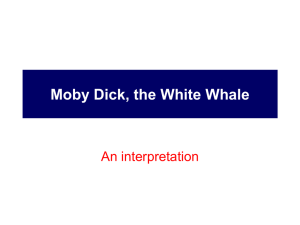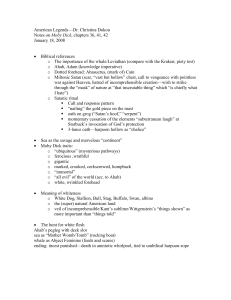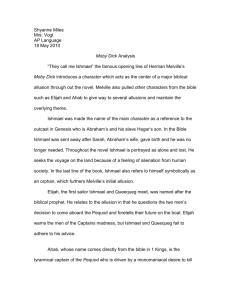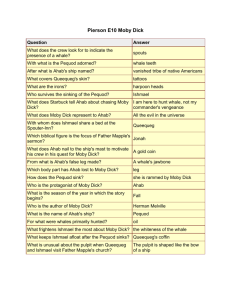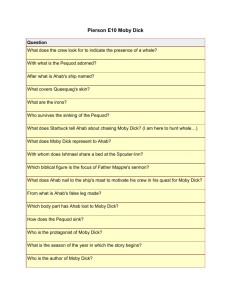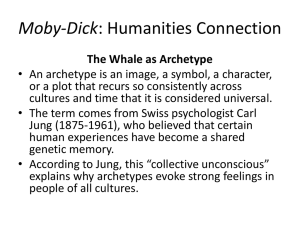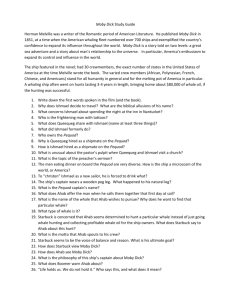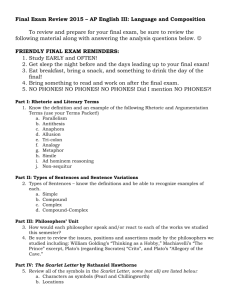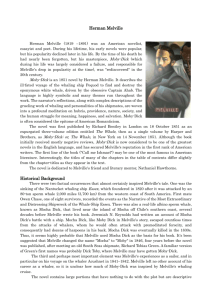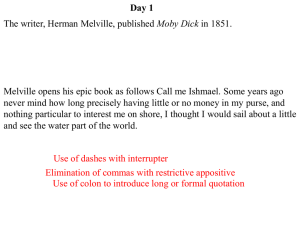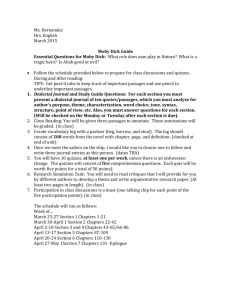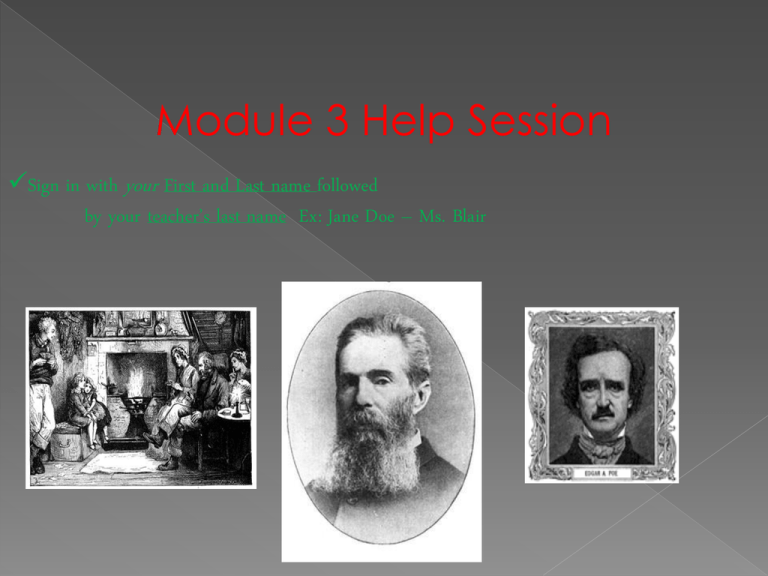
Module 3 Help Session
Sign in with your First and Last name followed
by your teacher’s last name Ex: Jane Doe – Ms. Blair
Allusion: a reference (implied or indirect) to a person,
place, or event
› "I violated the Noah rule: predicting rain doesn't count;
building arks does.“ (Warren Buffett)
Foreshadow: to represent, hint, or indicate beforehand
› How does a movie director let you know a killer is
approaching in a horror movie?
Irony: the use of words to express something other than
and especially the opposite of the literal meaning
Metaphor: comparisons made between two unlike
things that have something in common
› “My date was a few nuggets short of a Happy Meal.” (Ms.
Booz)
Stanza: a division in a poem
Symbol: something that represents something else
•Ship was named for the U.S.
Constitution and built in 1794
•Nicknamed “Old Ironsides” after a
British seaman shouted,“ Her sides
are made of iron.” after a cannon
bounced off the side of the ship
during a battle.
•Ship is currently in a museum in
Boston.
Ay, tear her tattered ensign down!
Long has it waved on high,
And many an eye has danced to see
That banner in the sky;
Beneath it rung the battle shout,
And burst the cannon's roar;
The meteor of the ocean air
Shall sweep the clouds no more.
Her deck, once red with heroes' blood,
Where knelt the vanquished foe,
When winds were hurrying o'er the
flood,
And waves were white below,
No more shall feel the victor's tread,
Or know the conquered knee;
The harpies of the shore shall pluck
The eagle of the sea!
Oh, better that her shattered bulk
Should sink beneath the wave;
Her thunders shook the mighty deep,
And there should be her grave;
Nail to the mast her holy flag,
Set every threadbare sail,
And give her to the god of storms,
The lightning and the gale!
Number of Stanzas?
What is the ship
compared to in the first
stanza?
What is the ship
compared to in the
second stanza?
In the last stanza, what
does Holmes say should
happen to this treasured
ship?
What can this ship
symbolize to our newly
formed and
independent country?
The tide rises, the tide falls,
The twilight darkens, the curlew calls;
Along the sea-sands damp and brown
The traveler hastens toward the town,
And the tide rises, the tide falls.
Darkness settles on roofs and walls,
But the sea, the sea in darkness calls;
The little waves, with their soft, white
hands
Efface the footprints in the sands,
And the tide rises, the tide falls.
The morning breaks; the steeds in their
stalls
Stamp and neigh, as the hostler calls;
The day returns, but nevermore
Returns the traveler to the shore.
And the tide rises, the tide falls.
Curlew = a bird
hostler = horse caregiver, groomer
efface = to erase, to withdraw
Steed = horse
What is personified in
stanza #2?
› How is it like a human?
What time of day does
stanza #1 represent?
› #2
› #3
PART ONE
Copy
and paste your questions
from your lesson.
Answer the 8 questions about
both poems.
PART TWO
Create your own poem!
Theme: End of an Era
› Graduation
› Parenthood
› Marriage
Poem must have uplifting ending.
Must have a TITLE.
Length: 4 lines to 1 page
Does not have to rhyme.
"Call Me Ishmael": The Voyage Begins
The story begins with a young Ishmael wanting to go to sea. The
story is then told from his point of view after his journey at sea.
He is looking back.
Ishmael is a Biblical name meaning outcast or wanderer.
Ahab’s only thought is to hunt down the whale and take his
revenge by killing it.
First mate, Starbuck, goes to sea to kill whales for their oil. He is a
businessman focusing on the job he has to do.
The Pequod is the ship Ishmael sails. It leaves out of Nantucket
on Christmas morning. As the ship sails, Captain Ahab is not
seen for days. He is only heard as his ivory peg leg hits the deck
as he walks.
Whales and the American Whaling Industry
The whale represents different things to different characters in the
novel. To Ahab, the whale represents all that is evil in the universe.
To Starbuck, the whale represents an animal to be killed for oil.
To Ishmael, the whale represents nature in all its wonder both
beautiful and terrifying.
In the 1840’s, New England was at the height of the whaling era.
The U.S. dominated the whaling industry supplying oil for street
lamps, lanterns, machinery, etc. Whale oil was the oil of commerce
from 1800 to 1850.
Jobs were readily available on whaling ships. All types of people
were welcomed in this industry such as free blacks, Native
Americans, and foreigners. The work was dirty and workers were
underpaid and undersupplied.
Portrait of the Author: Herman Melville
Born in 1819 in New York near the harbor.
At age 11, his father fell into debt and died.
At 21, he set sail for the South Pacific.
After 4 years at sea, he returned to New York and
wrote of these adventures.
His first two books were very successful, and he
became famous.
At age 30, he’d written 5 books. He was now ready
to write Moby Dick.
Halfway through Moby Dick, Melville meets
established writer, Nathaniel Hawthorne.
Melville feels Hawthorne understands the depth of his
writing and can help him with it. Melville dedicates
the book to Hawthorne.
America in the Mid-19th Century: The Pequod as a "Little
Democracy"
When Melville wrote Moby Dick, he felt the country was
slipping away from the ideals of the founding fathers.
The Industrial Revolution was transforming the American
landscape. People were moving West in search of gold.
The Civil War was 11 years away, and slavery was dividing
the country.
He explored these different themes in his novel.
On board, there were 4 different harpooners, each
representing a different culture.
Melville was concerned about bringing together all of the
races of the world. The Pequod then becomes a
metaphor for a ship of state, a little democracy.
As the voyage continues, Moby Dick remains elusive.
1851 Moby Dick was a failure.
Melville disappeared from the literary world.
Hollywood rediscovered the novel in the 20th Century.
Cruel Obsession: Ishmael Separates from Captain Ahab
One night, Ishmael is on deck. He has a vision. He realizes
Ahab is obsessed and overtaken by his anger against the
whale. He realizes he needs to separate from Ahab.
Ahab Versus the White Whale: A Fight to the Death
The white whale is spotted.
For 2 days, Ahab tries to kill the white whale.
Day 3, the whale attacks the ship, killing every man on
board.
Ahab and Ishmael are in small boats. Moby Dick surfaces
next to Ahab. Ahab harpoons him, but the rope gets
wrapped around his neck and pulls Ahab under the sea.
All are gone except Ishmael. He floats along until the ship,
Rachel, picks him up. He lives to tell the tale while the
white whale swims the ocean.
The End: The Final Years of Herman Melville
15 years after publication of Moby Dick,
Melville fell into obscurity. He’s broke,
unemployed, and father of 4 children. He
took a job as customs inspector at Port of
New York for $4 a day.
He never received public recognition
again.
When he died, the New York Times got his
name wrong.
Now, his masterpiece endures.
Part B
Part A
View the video.
› Login: flvs4
› Password: student
Take a look at the help file you saved.
Respond to the questions provided.
Give yourself a proper title.
Example: Linda Nett, New York Times, or Manuel Eber, Washington Post.
Choose one of the following characters to interview:
Ishmael
Ahab
Melville
Create a list of five interview questions related to the novel (which you
learned about in the film) you would ask your chosen character.
Example: “Ishmael, why did you choose to stay on the Pequod
knowing you would have many surly characters for shipmates and
a madman for a captain?”
As you create your questions, appropriately incorporate your sense of
humor, or simply do what every good reporter strives to do: find the
real scoop!
Include appropriate web-art to reflect your make-believe character,
your true self, or your questions for the interviewee.
Have fun with this assignment!
Zooming Along!
Wow! This was a great activity.
I learned so much and I want to learn more!
Cruising Along!
I enjoyed the activity. I hope I make a good grade.
Riding Along!
I did what you asked and think that I did a good job.
Car Sick!
I don’t care. Can I please go now ?
Asleep in the Car!
I didn’t take any notes. Leave me alone. I’m going
to bed.

